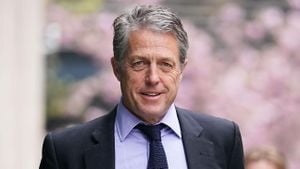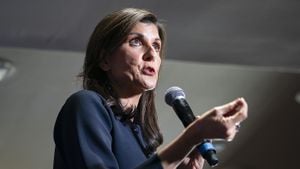Elon Musk, the tech billionaire and significant ally to President-elect Donald Trump, has become entwined in international diplomacy as he recently facilitated discussions intended to reduce tensions between the United States and Iran. This unexpected development suggests potential shifts in American foreign policy, with Musk meeting Iran's Ambassador to the United Nations, Amir Saeid Iravani, to discuss pivotal issues surrounding Iran's nuclear program and its role within the volatile Middle East.
Reports indicate the meeting took place at a secret location over the course of more than an hour. Neither Musk nor the Trump transition team has officially confirmed the encounter, though unnamed officials claimed it was aimed at exploring pathways for improved relations with Tehran, which had been strained during Trump's previous term when he withdrew from the Joint Comprehensive Plan of Action (JCPOA)—the nuclear agreement aimed at curbing Iran's nuclear ambitions.
According to the New York Times, the discussions also touched on Iran's support for various groups across the region and the broader geopolitical climate, particularly concerning conflicts like the recent Gaza war and the tensions along the Israel-Lebanon border. Musk's involvement, particularly as someone who is now identified as leading the newly established Department of Government Efficiency (DOGE) within Trump’s administration, showcases the blending of business and politics at the highest levels.
Intelligence sources have pointed out Iran's apprehensions about Trump's administration, wary of his potential to escalate existing tensions. During his last term, Trump adopted a 'maximum pressure' campaign against Iran, characterized by stringent sanctions and military posturing. Following the assassination of Iranian General Qassem Soleimani, which Trump ordered, Iran publicly vowed to retaliate, complicative factors for any diplomatic overtures.
One of the notable developments leading up to Musk's meeting was Iran's purported communication with the Biden administration, wherein it expressed intentions not to pursue aggressive tactics against the former president. This gesture signaled Iran’s cautious approach after years of hostilities, which had built peaks of tension under Trump's first presidency.
Keeping track of political personnel changes, Trump’s team has announced foreign policy appointments, including Senator Marco Rubio for Secretary of State and Representative Mike Waltz for National Security Advisor. These individuals have historically been known for their stern outlook on Iranian relations. Under such looming appointments, Musk's meeting with Iravani may act as both a strategic meeting point and narrative shift, pointing toward Trump's inclination to engage diplomatically rather than merely advancing aggressive policies.
The Iranian regime, traditionally seen through the lens of confrontation with the West and especially with the United States, appears to be testing waters with its outreach to Musk, depicting the interaction as part of its broader strategy for reducing isolation and economic distress. Iranian officials are reportedly optimistic about forging new ties as the world navigates the complex web of threats and alliances.
Some analysts interpret this diplomatic maneuvering as signaling Trump's potential shifts toward engagement with Tehran, particularly as the new administration anticipates several monumental decisions surrounding the Iran nuclear deal. Trump’s administration may favor negotiating nuances within the existing framework rather than simply rejecting prior agreements.
Iran has long expressed its desire for reliving more favorable diplomatic relations, signaled by new reformist leadership interested in uneasier discussions with Washington. The cautious optimism underscored by Musk’s meeting could stimulate discussions aimed at de-escalation, signaling to both nations and regional dynamics alike the potential for renewed dialogues.
Despite current tensions, including incidents tied to Iranian support for groups labeled as terrorist organizations by the U.S. government, the hope remains for strategic dialogue. Such meetings, especially one involving the world’s richest man, bring unprecedented visibility to the negotiation channels. The juxtaposition of Musk’s influence and Trump's historical hardline stance presents uniquely complex narratives yet to be fully unraveled.
The magnitude of Musk's role is not only indicative of new approaches but expresses growing intersections between technology and international relations, transforming how dialogues will proceed. Musk’s technological innovations often rise alongside his business ventures, raising questions on the interplay of economic power and diplomatic potency moving forward.
Policy experts from various spheres have noted how tensions threaten to unravel peace across the Middle East, especially with destabilizing forces actively engaged in regional conflicts. Leaders have increasingly voiced concerns over job creation and stability, presenting the interdependent nature of technological and socio-economic strategies as they pivot to address not just antagonistic legacies but down paths toward potential normalization.
Meanwhile, the specifics of the meeting remain closely held, with no official disclosures available yet from Trump’s transition team nor Iran’s UN mission. The absence of public statements may suggest diplomatic decorum or calculated funnelling, though the strategic internet perspective could offer glimmers of the sort of conciliation once relegated to hopes of the past.
The timeline leading to Musk’s meeting cannot escape the backdrop of political tensions already tested along various international fronts. From the ever-volatile Israel-Palestine situation to the continuing aftermath from the 2023 Gaza conflict, the forecasting of diplomatic feasibility seeks renewed positioning.
While definitive impact remains to be seen, the very act of such meetings holds inherent promise. Intelligent observations might tease apart elephantine challenges endured yet untamed; yet, only with time will those discussions yield dividends measurable on foreign policy fronts.
Collectively observing these planetary segments where business and politics meet reflects growing divergences but also newfound synergies, and Musk's latest interactions have showcased this entwined fate. Perhaps the key will be not only how leaders engage and interact but whether trends signify true shifts. Given Trump’s established record, leaders on both sides of the aisle now find themselves engaging with uncertainties, perhaps seeking partners for ambitious collaborative endeavors.
Trump himself hewed closely to narratives of strength and military governance, yet the ever-evolving scenes upon bipartisan shores might force reconsideration onto paths marked for diplomacy rather than destructive endeavors. The uncertainty clings thick and swift across any assurance.
Stretched across these dynamics is the scent of hope—recognition from both Iran and America emerged within the past weeks mouthed through chain reactions of diplomacy sparking intensity not swiftly ignored. Undoubtedly, the door remains ajar, permitting discussions to forge connections, providing signals of lighter pathways amid darkened corridors.
If anything, the ensuing waves of dialogues mirror the internal struggles wrought by ages of fraught relations, yet they also underline wonders waiting to unfurl when once again human goodwill seeps back along countless histories yet unfurling with expectation across dimensions wide.



